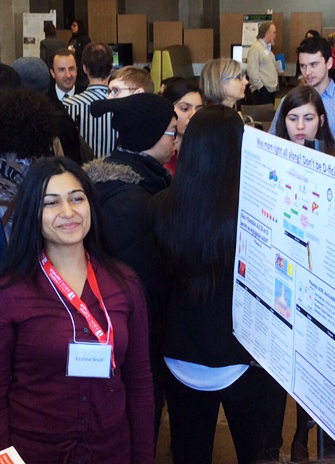Scott Library’s Collaboratory, the site of York University’s third annual Undergraduate Research Fair, was buzzing with energy and excitement on Feb. 25 as 73 students got ready to share the results of their research with the York community. They had quite an audience. In all, more than 350 people – from faculty, staff and students to proud parents – attended the fair.

The student researchers came from all Faculties and both campuses. They presented 56 posters that spanned a range of topics with intriguing titles such as:
- “The Downside of the Web: Compulsive Internet Use, Empathy and Altruism”;
- “Ditchin’ the Cafeteria: The Culture of Eating Lunch out for High School Students”;
- “The Black Girl’s Burden: The Impact of Sexual Stereotypes on the Reproductive & Sexual Health of Black Women”;
- “They Kiss and the [Odd Body] Swells: Fragmenting Queer Bodies in 1980s Canadian Drama”;
- “The Language of Signs: Exploring the Linguistic Landscape of Toronto’s Financial District”; and
- “It takes a Village to Raise a Child: Early Childhood Development as a Social Determinant of Health”.
The multidisciplinary fair, co-sponsored by York University Libraries and the Office of the Vice-President, Research and Innovation (VPRI), benefited this year from additional financial support from the Faculties and other generous donors. In his opening remarks, VPRI Robert Haché thanked all the applicants for demonstrating that research at York is accessible and emphasized that undergraduate students are a valuable part of the University’s research culture.
“Here at York, we value the work of all of our student researchers,” said Haché. “As a comprehensive, research-intensive institution, York is committed to exposing all our students to cutting-edge research and scholarship, and to making research accessible for them.”
“The scope of submissions was extraordinary and so was the passion and commitment of the students,” said event MC and Interim University Librarian Catherine Davidson. “For me, hearing the students speak about their work and about how much they appreciated the opportunity to share the outcome of their research with the broader community was the highlight of the fair.”
Both Peggy Warren and Dana Craig, co-founders of the Undergraduate Research Fair, emphasized that the event is truly for students and about students. In addition to fair presenters, undergraduates are represented on the steering committee and, new this year, the event featured the musical talent of a trio of student musicians from the York University Symphony Orchestra. The fair was documented by two student photographers from the School of the Arts, Media, Performance & Design.

In addition to the work conducted to translate their research papers to posters, student presenters will be invited to revise their papers into articles for consideration for publication in the library-sponsored e-journal YOUR Review (York Online Undergraduate Review), to be launched in 2015.
Some presenters used Twitter to express their thanks while others shared their thoughts in person. “This event has given me the confidence and affirmation that I can succeed,” said one student presenter. “I never considered grad school before yesterday, but I am in the process of applying now.”
Faculty of Liberal Arts & Professional Studies Dean Martin Singer and Faculty of Health Associate Dean William Gage presented awards to the top research projects, along with steering committee members Maz Fallah (a professor in York’s Faculty of Health) and Andrea Kosavic (digital initiatives librarian). Sophie Bury, head of the Peter F. Bronfman Business Library at York University, and Dana Craig, assistant librarian, reference, presented the Information Literacy Award. The People’s Choice Award was selected by those who attended the Undergraduate Research Fair.
“I was really energized by the enthusiasm of our undergraduate researchers,” said Singer, “and by the diverse and imaginative projects described in their impressive poster presentations. Bravo!”

The numerous high-calibre presentations made it a challenge for the adjudication teams to select the first and second prize winners of the following seven awards. The winners and their research were introduced to the York Community later that day at the York U Research Leaders celebration where they were able to mingle with graduate and faculty research award winners.
The York University Undergraduate Research Fair award winners are:
Dr. James Wu Prize for best lower-year project:
- First prize: Christopher Ford for “Doctor-Assisted Death in Canada: A Story of Pain, Suffering, and Legal Equality” (AP/HREQ 2010)
- Second prize: Jessie Spasov for “The Hanger: A Space in Need of Change” (AP/GEOG 2075)
Dr. James Wu Prize for best upper-year project
- First prize: Matthew Pancer for “The Certainty Paradox: How Despairing Over Uncertainly Leads to the Certainty of Despair” (AP/EN 3536)
- Second prize: Rachel England for “The Ashes of a Western Blaze” (ES/ENVS 4011)
Dr. James Wu Prize for best thesis/major term project
- First prize: Jesse Thistle for “We are children of the river: Toronto’s Lost Métis History” (GL/HIST 4100)
- Second prize: Ewan Gibson for “Comfort Level With Technology & Perceived Support in College Faculty” (HH/PSYC 4170)
Best group project
- First prize: Sean Liotta and Jeffery Marchment for “Control Shift: A Puzzle-Platformer Video Game Utilizing Multiple, Unique Control Schemes” (LE & AMPD/EECS 4700)
- Second prize: Joanne Kotasinska and Kirsten Muller for “French Language Policy at Glendon for Anglophone Specialists” (GL/LIN 4617)
Best poster and presentation
- First prize: David Kim for “The Kamikaze of Plant Invaders: Japanese Knotweed (Fallopia Japonica)” (SC/BIOL 4095)
- Second prize: Christopher Lovell and Michelle Binczyk for “Changes in Anthropod Composition Across a Forest-field Ecotone” (SC/BIOL 3001)
Information Literacy Award
- First prize: Julien Cossette for “#OccupyGezi: On Twitter and Affective News” (AP/ANTH 4220)
- Second prize: Nick Zabara for “Rage and Joy: The Origins of Human Emotion” (HH/PSYC 3010)
People’s Choice Award
- Denise Enriquez, Dallis King, Anna Papazian and Samantha Puder for “Secret Body: An Interactive Art Installation” (LE & AMPD/EECS 4700)


